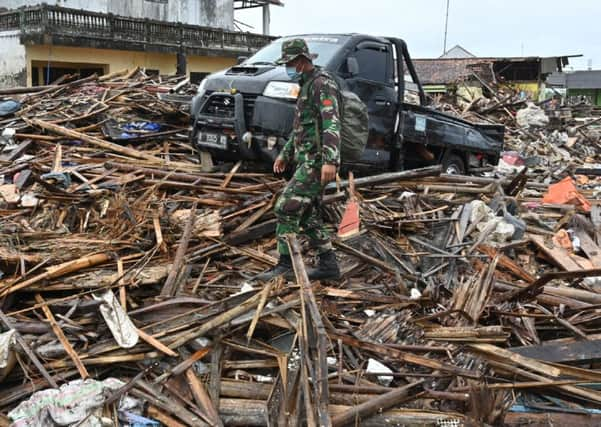Mercy Corps in emergency response to Indonesian tsunami as death toll mounts


At least 429 people died, and more than 1400 were injured when the tsunami slammed into parts of western Java and southern Sumatra islands on Saturday night. Over 128 people are missing and more than 16,000 are displaced.
Unlike most tsunamis, this time there was no large earthquake to warn people to run to higher ground before the waves arrived. Instead, an eruption of the infamous volcanic island Anak Krakatau – or “Child of Krakatoa” – appears to have triggered a landslide on its slope, which then sent displaced seawater racing.
Advertisement
Hide AdAdvertisement
Hide AdMercy Corps, which has worked in Indonesia for nearly 20 years, is among the aid agencies responding to help those in the hardest-hit areas.
Mercy Corps spokeswoman Christy Delafield said: “Based on our experience, we anticipate the most pressing needs to be clean water, temporary shelter, soap and other essential supplies for those affected.
“We have some 120 team members in Indonesia, many of whom are seasoned experts in disaster response.” Indonesia’s Disaster Mitigation Agency said there was an urgent need for heavy equipment in the Sumur subdistrict, a remote area near Ujung Kulon National Park that experienced heavy damage. Some villages there have been cut off due to damaged roads and bridges, making it difficult to supply aid and reach people who may be injured or trapped.
Residents remained jittery and fearful of remaining near the coast. In at least two separate areas yesterday, panicked residents ran toward higher ground because they believed another tsunami was coming.
Advertisement
Hide AdAdvertisement
Hide AdPeople in Sumur remained stunned by how quickly the tsunami hit without warning. Sumur beach, located just a few miles from the tourist island of Umang near Java’s western tip, is popular for snorkeling and other water activities. The tsunami devastated the area, ripping houses from their foundations and bulldozing concrete buildings. Villagers described a soaring white wall of water roared forward at high speeds, ripping trees out of the ground by their roots.
Troops, government personnel and volunteers continued searching along debris-strewn beaches. Yellow, orange and black body bags were laid out where victims were found, and weeping relatives identified the dead. Many searched for missing loved ones at hospital morgues.
Indonesian president Joko Widodo, who faces a tough re-election campaign next year, has vowed to have all tsunami-detection equipment replaced or repaired.
Saturday’s disaster came ahead of the anniversary of the massive Asian tsunami that hit on Boxing Day 2004, after a magnitude 9.1 earthquake off Sumatra island spawned huge waves. The giant wall of water killed some 230,000 people.